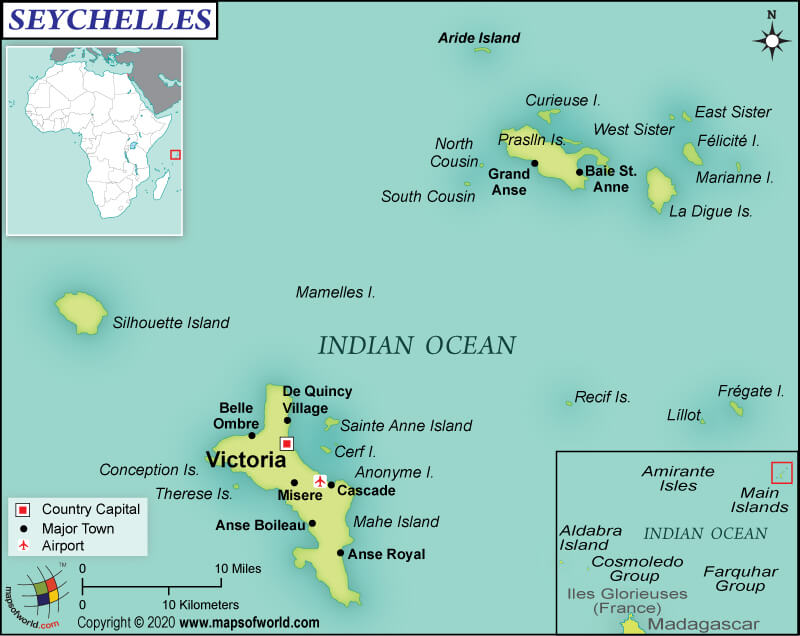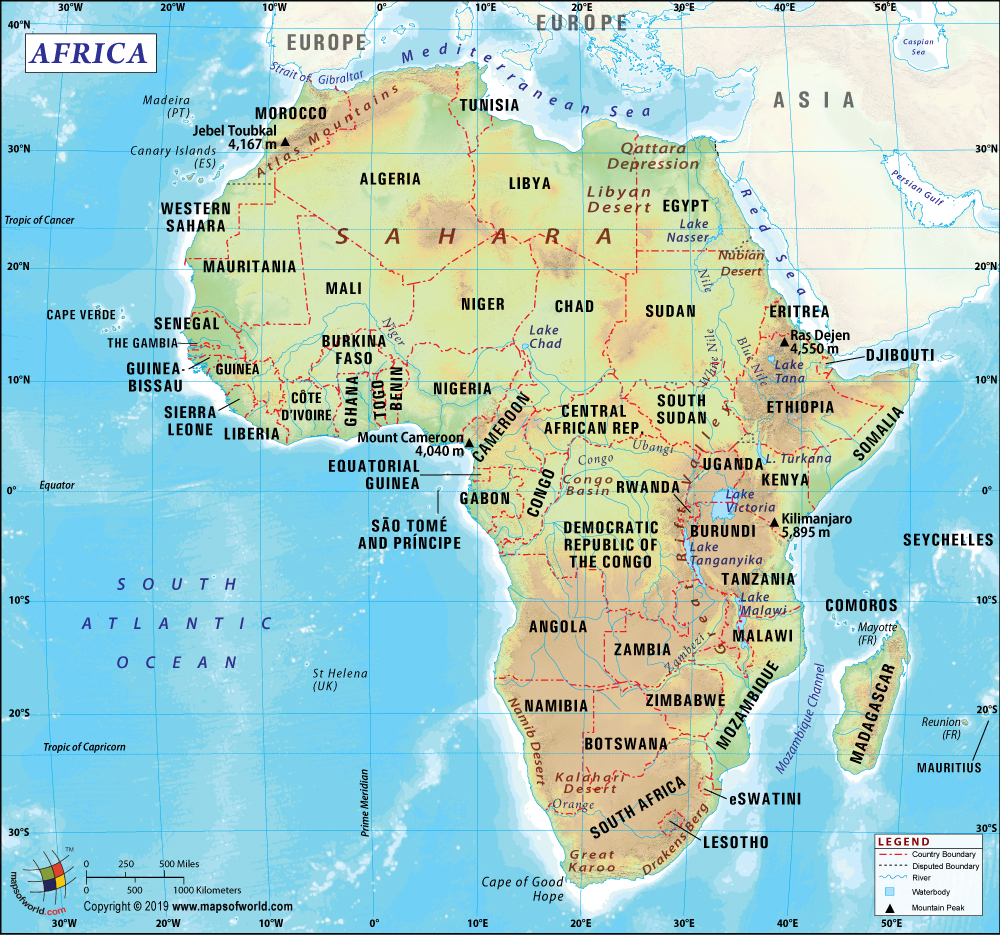What are the Key Facts of the Seychelles?

|
Official Name |
Republic of Seychelles |
|
Continent |
Africa |
|
Capital |
Victoria |
|
Largest City |
Victoria |
|
Coordinates |
-4.668298, 55.467239 |
|
Area |
177 sq. mi ( 459 sq. km) |
|
Land Boundaries |
0 mi (0 km) |
|
Coastline |
305 mi ( 491 km) |
|
Currency |
Seychellois rupee (SCR) |
|
Neighboring Countries |
Nearby island countries include Comoros, Madagascar, Mauritius, and Maldives. |
|
Population |
94,228 (2016 est.) |
|
Official Languages |
English, French, Seychellois Creole |
|
Major Religion |
Christianity |
|
National Day |
18 June (Constitution Day), 29 June (Independence Day) |
|
National Anthem |
“Koste Seselwa” |
|
Form of Government |
Unitary presidential republic |
|
President |
Danny Faure |
|
Vice President |
Vincent Mériton |
|
GDP per capita (PPP) |
$29,327.6 (World Bank, 2017) |
|
GDP per capita (nominal) |
$15,629.3 (World Bank, 2017) |
|
HDI |
0.797 (2017), Rank: 62 |
|
Literacy Rate |
NA |
|
Space Agency |
NA |
|
Military Expenditure Ranking |
142 (SIPRI, 2017) |
|
No. of Olympic Medals |
0 (as of 2018) |
|
Driving Side |
Left |
|
Calling Code |
+248 |
|
Time Zone |
UTC+4 (SCT) |
|
Internet TLD |
.sc |
Where are the Seychelles?
The Seychelles is an archipelago country (made up of 115 islands), located in the Indian Ocean. Its capital Victoria is located 1,500 kilometers (932 miles) to the east of East Africa. While island nations such as Mauritius, Comoros, and Madagascar are located to the south, Chagos Archipelago and Maldives are located to the east of Seychelles. The nearest foreign mainland country to Seychelles is Somalia.
What is the Geography of the Seychelles?
The total landmass of the country is just 459 square kilometers (177 square miles). The Seychelles archipelago has two kinds of regions:
-
Granitic islands: The main islands in this group include Mahé, Praslin Island, La Digue, and Silhouette Island.
-
Coralline outer islands: The main coralline islands are Bird Island and Denis Island.
-
Artificial islands: Romainville Island is an artificial island.
While the granitic islands are the oldest ones, the coralline islands are the younger ones. Around one-third of the total land area of the Seychelles is present in Mahé (the largest island in the group with 156.7 square kilometer area); another one-third is present in Aldabra coral atoll.
The coralline islands are predominantly flat and rise just a few feet above sea level. However, they have elevated coral reefs, which are formed at different stages. Mahé’s landscape is mainly rocky along with a narrow coastal strip. A range of hills (running upwards of over 2,000 feet or 609 meters) is present in the central part of the island. Morne Seychellois is the highest point in Seychelles with 2,969 feet (905 m) height. It is located in mountainous formations in Mahé island.
There are 41 peaks in Seychelles archipelago. Some of the major ones include Morne Seychellois, Trois Freres, Congo Rouge, Mont Le Niol, Morne Blanc, Monte Jasmin, Mount Harrison, Mount Simpson, Castle Peak, Copolia, Peak 493 m, Les Dents, New Savy, Mont Coton, Monte Brulée, and many more.
No significant rivers or lakes are present in Seychelles archipelago. Some of the rivers found in these islands are concentrated mostly in Mahé. Those rivers are Rochon, Cascade, Bougainville, Du Cap, Barbarons, Dupuy, and Caiman rivers. 491 km (305 miles) is the total coastline of Seychelles archipelago.
The Seychelles islands have a tropical climate. The weather is predominantly warm and humid. Strong maritime influences are there. Throughout the year, some humidity is always there, due to the influence of the sea. The temperature hovers around 24-32°C consistently.
May to October is relatively cool and dry. In July-August, the average temperature revolves around 27°C . Seas remain a little choppy. In November, light, warmer winds start blowing. This is the main rainy season of Seychelles archipelago. December-January witness light winds blowing, and the sun is warmest during this time. The vegetation is lush green during these months. In fact, December and January is also the cyclonic season. However, cyclone belt is mainly located in the most remote southern islands. April is the calmest and warmest month. During this month, the wind direction starts changing. In fact, October to April is calm and warm.
What is the Economy of the Seychelles?
The economy of the the country has grown by 7 times since independence in 1976. Tourism (which employs around 30% of the total labor force) is the main contributor to the growth of the Seychelles economy. The Seychelles government is also providing emphasis on other sectors such as tuna fishing, farming, and small-scale manufacturing for reducing the economy’s overdependence on tourism. The government is also encouraging foreign investment for upgrading the hotels as well as other services.
Since its near-subsistence level during pre-independence time, the country has now grown significantly to be considered among upper-middle-income group. In 2017, the country grew at 4.1%, thanks to the strong performance of the tourism sector and low commodity prices. While Per Capita GDP of the country is US$ 15,578, its nominal GDP is $1.475 billion (IMF, 2017).
What is the Transportation System of the Seychelles?
The transportation System of the the country mostly includes 526 km of roads, and airports, and seaports. The country has one registered air carrier, and 14 airports. The main ones are Seychelles International Airport and Praslin Island Airport. There are no major railways available in Seychelles, while Victoria is the main seaport.
What International Organizations is the Seychelles part of?
UN, UNCTAD, UNESCO, IMF, WTO (observer), ILO, WHO, Interpol, NAM, G-77, ACP, AfDB, AOSIS, AU, C, CD, COMESA, EITI (candidate country), FAO, IAEA, IBRD, ICAO, ICC (NGOs), ICCt, ICRM, IDA, IFAD, IFC, IFRCS, IMO, InOC, IOC, IOM, IPU, ISO (correspondent), ITU, MIGA, OIF, OPCW, SADC, UNIDO, UNWTO, UPU, WCO, WIPO, and WMO.

